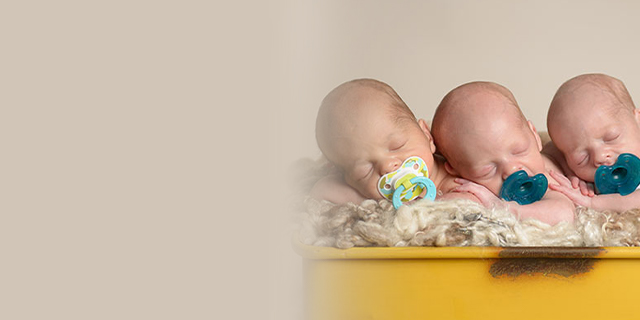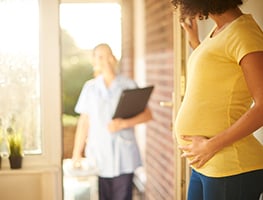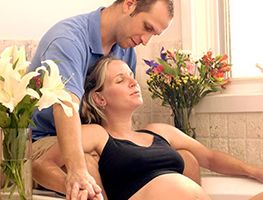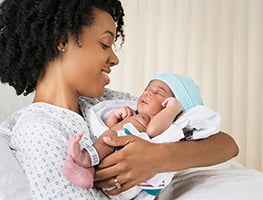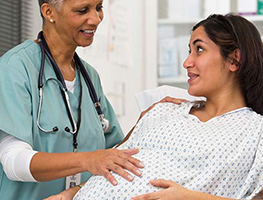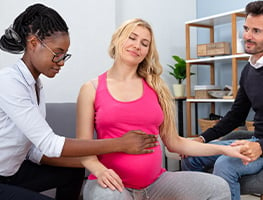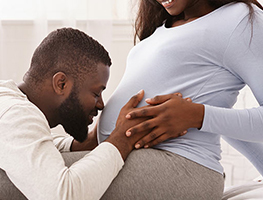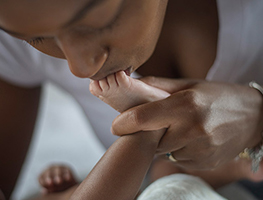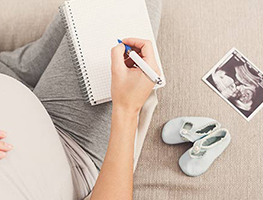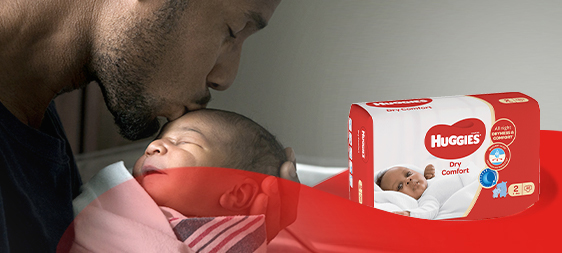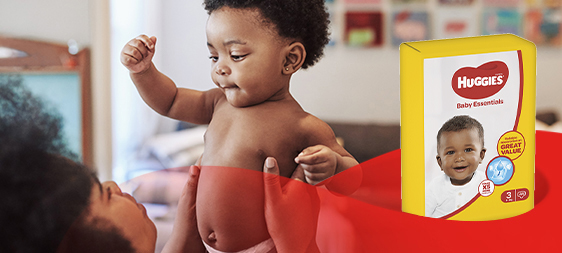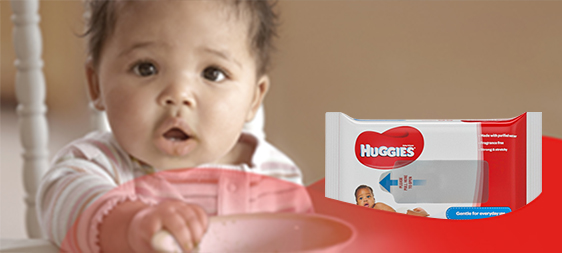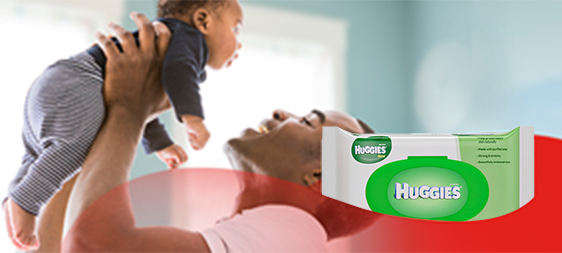Triplets can be what are known as Higher Order Multiples (HOM), which signifies more than two babies are being carried at one time. Although rare, it is entirely possible for women to conceive naturally with three babies. However, fertility treatment is the strongest influential factor when it comes to having triplets. Triplets can be either monozygotic - meaning they are formed after one fertilised egg has split into three identical embryos, or they are dizygotic - meaning they are formed from separate eggs (i. e. polyzygotic).
Triplets can also occur when there is a set of identical (or monozygotic) twins conceived and another egg is released, which is then fertilised by another sperm. One very cute term often used to describe the most common form of spontaneously conceived triplets -identical twins + a fraternal sibling is: "A pair and a spare".
This means that the identical twins are always the same gender and exactly the same DNA but the "spare" could potentially be of the opposite sex and share no more characteristics than any other sibling.
Why do so many older women seem to have multiples?
One explanation for why multiples are more common in older women is because, as the eggs get older, their quality diminishes and the chances of them splitting increases.
Ovarian production also tends to peak as women age; there is generally a spike in fertility before women enter their peri-menopausal years. Perhaps this is nature's way of maximising the chances of a woman having another baby or two before she becomes infertile.
There are also theories about how the brain influences hormone levels and that hormonal imbalance in some women becomes more common. This then affects ovarian stimulation and how many eggs are supported to maturation each month.
Ways to conceive with triplets
-
Be an older woman. Women who are aged 30 years plus have a greater chance of conceiving with multiples than younger women do.
-
Be of African descent.
-
Consider having fertility assistance. Around 85% of triplets are conceived through fertility treatment.
-
Women that have previously had fertility treatment have a higher than average chance of conceiving naturally with triplets with their consecutive pregnancies.
-
Have older children; conceiving with multiples is more common in women who have had babies previously.
-
Come from a family where there is a history of multiple births. Or better still, have your own personal history of having had multiples previously.
-
Be very, very lucky!
What are my chances of having triplets?
The odds of naturally conceiving with triplets are around 1 in every 10 000 births. Via fertility assistance, the likelihood increases significantly. By far the most likely way to conceive with triplets is to have fertility assistance and/ or take medication, which increases ovulation.
If you come from a family where hyper-ovulation occurs, i. e. when the ovaries release more than one egg each month, then you are more likely to conceive with multiples, including triplets.
There is nothing you can consciously do to increase your chances. Other than having lots of sex when you are most fertile. Overall, this will increase your chances of conceiving with even one baby.
There does not seem to be any scientific evidence to support the theory that having identical multiples is influenced by heredity. It seems that the splitting of a fertilised egg happens at random. But hyper-ovulation is certainly influenced by genetics, so women who come from families where non-identical multiples are common do have more chances of having their own multiple births.
Will my triplets be born early?
By far the majority of triplets are born premature. This means that they do not reach full term and come before the normal gestational period for human babies, which is 38-42 weeks. There are many reasons for this, but generally, it is because of a lack of room to grow any further in the mother's womb.
Most triplets are born between 32-34 weeks of gestation and caesarean section delivery is common. Smaller hospitals tend to refer mothers pregnant with triplets to larger metropolitan or maternity hospitals. This is because of the availability of specialist staff and resources for both obstetric and premature baby care.
Common parent reactions when triplets are confirmed
Shock, denial, terror and anxiety are the most common responses. Most parents find out they are expecting triplets when an ultrasound is done and 3 tiny embryos are seen on the screen. Multiples may be suspected beforehand due to exaggerated pregnancy symptoms, the use of fertility drugs or assistance, or alternately, a family history of multiple births. But suspecting triplets may perhaps be in your future and having this confirmed are very different realities.
Many couples emerge from the ultrasound office feeling numb and in shock. They know what they've been told and even what they've seen, but the reality of this can be too much to take in. There is no one right way to feel when being told that you're having triplets.
Disbelief, coupled with denial that there must be some sort of mistake, also helps to insulate parents from the reality. At least until there has been some time to let the magnitude of this news filter through.
It is also common for couples to respond very differently to each other; one may be utterly delighted from the start and the other partner almost horrified. It can pay to just aim for a quiet few days to let the news settle into your brain and for rational thought to replace surging emotions. Don't worry about the embryos "knowing" you're less than delighted. This is impossible and their brains are too immature to be capable of interpreting their parent's reactions.
Be prepared for some interesting responses from your family and friends, and even total strangers, when you tell them you're expecting triplets. Their responses are often so much more about how they would react given the same situation, rather than their feelings about your reality. Just be prepared to smile and try to ignore any negative comments.
Support from close family and friends, as well as multiple birth agencies, will help you to process any nagging doubts and/ or anxieties you're bound to have.
Complications of having triplets
-
Greater risk and range of pregnancy complications generally
-
Premature delivery
-
Delayed foetal growth otherwise known as IUGR – Intra-Uterine Growth Restriction, or SGA – Small for Gestational Age
-
Maternal Preeclampsia
-
Gestational Diabetes
-
Anaemia
-
Placenta Praevia
-
Increased risks to the babies include a higher likelihood of cerebral palsy, prematurity complications including breathing, feeding difficulties, and issues with maintaining normal temperature and blood sugar levels
Logistics of having triplets - what to consider
-
The size of your house, where the babies will sleep and how you’ll fit three cots in.
-
Your car – fitting three car seats into a standard family vehicle may be a challenge.
-
A pram or buggy to fit three babies, as well as a toddler and older children, if you have them.
-
Three lots of everything, including clothing, bed linen, nappies, changing areas and feeding requirements. Many mothers of triplets do breastfeed or express breast milk for their triplets, at least in the early months. A breast pump will make this job so much easier. Do some research early on in your pregnancy and decide how you want to feed your baby and what will work for you.
-
Avoid thinking you need to buy everything new. Borrow, lend, rent or buy second-hand (just ensure that any second-hand or used furniture and equipment you get is considered safe). You’ll be amazed by the offers you’ll get of clothing, nursery furniture and general baby goods. Don’t be too proud; you will need to get used to accepting all reasonable offers of support and this includes gear that will make life so much easier (and cheaper) for you and your family.

